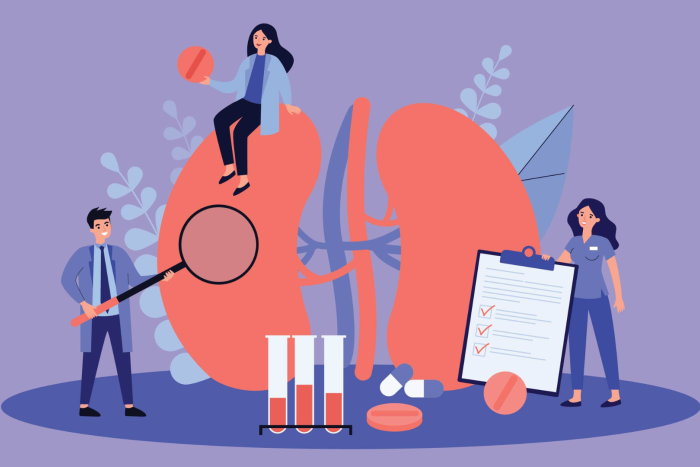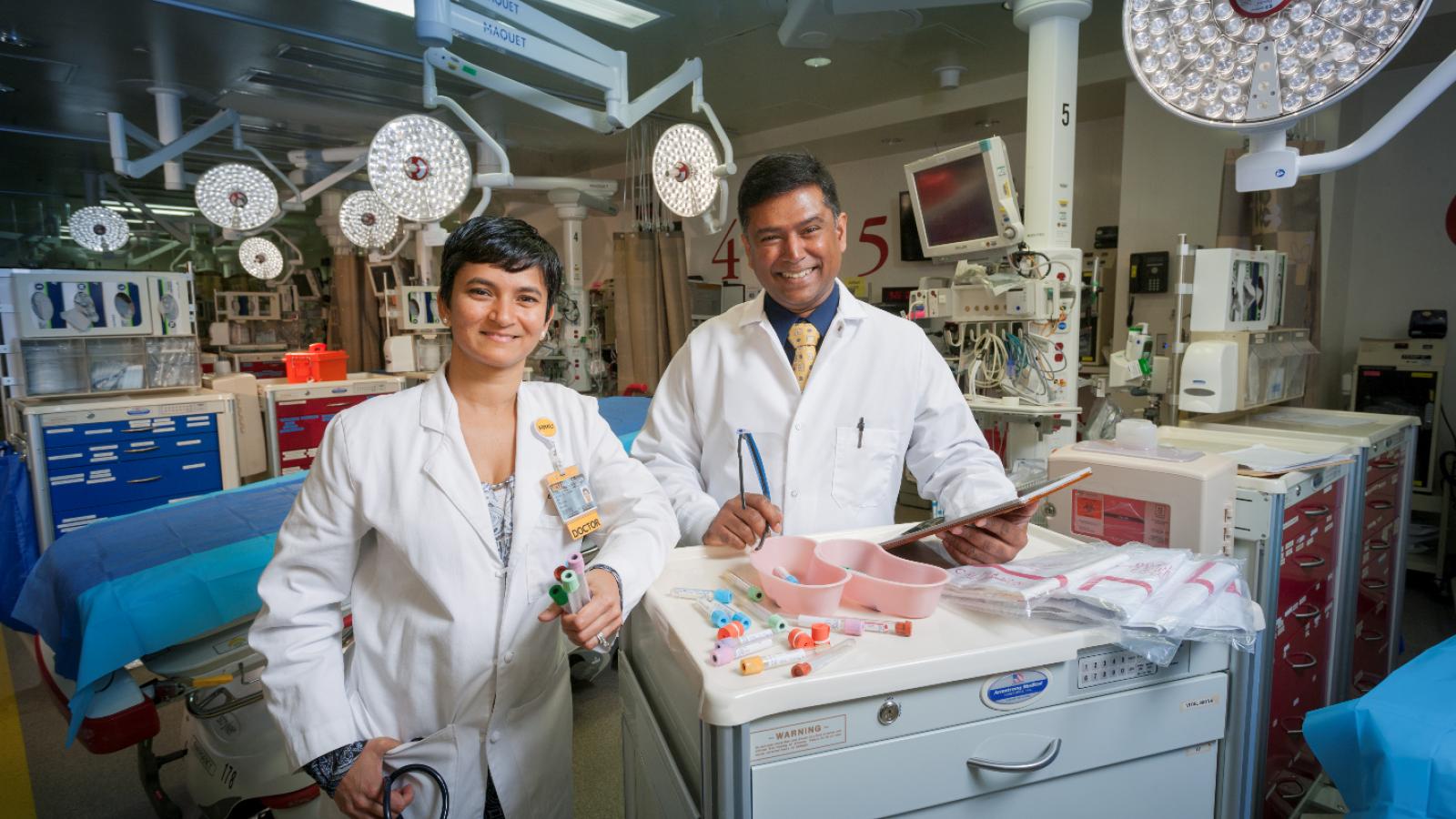
VCU Health trauma surgeon Sudha Jayaraman, M.D., and VCU School of Pharmacy assistant professor Dayanjan “Shanaka” Wijesinghe, Ph.D., collaborate on using mass spectrometry as a new method of analyzing what medications are in a patient’s blood. Photo: Karl Steinbrenner
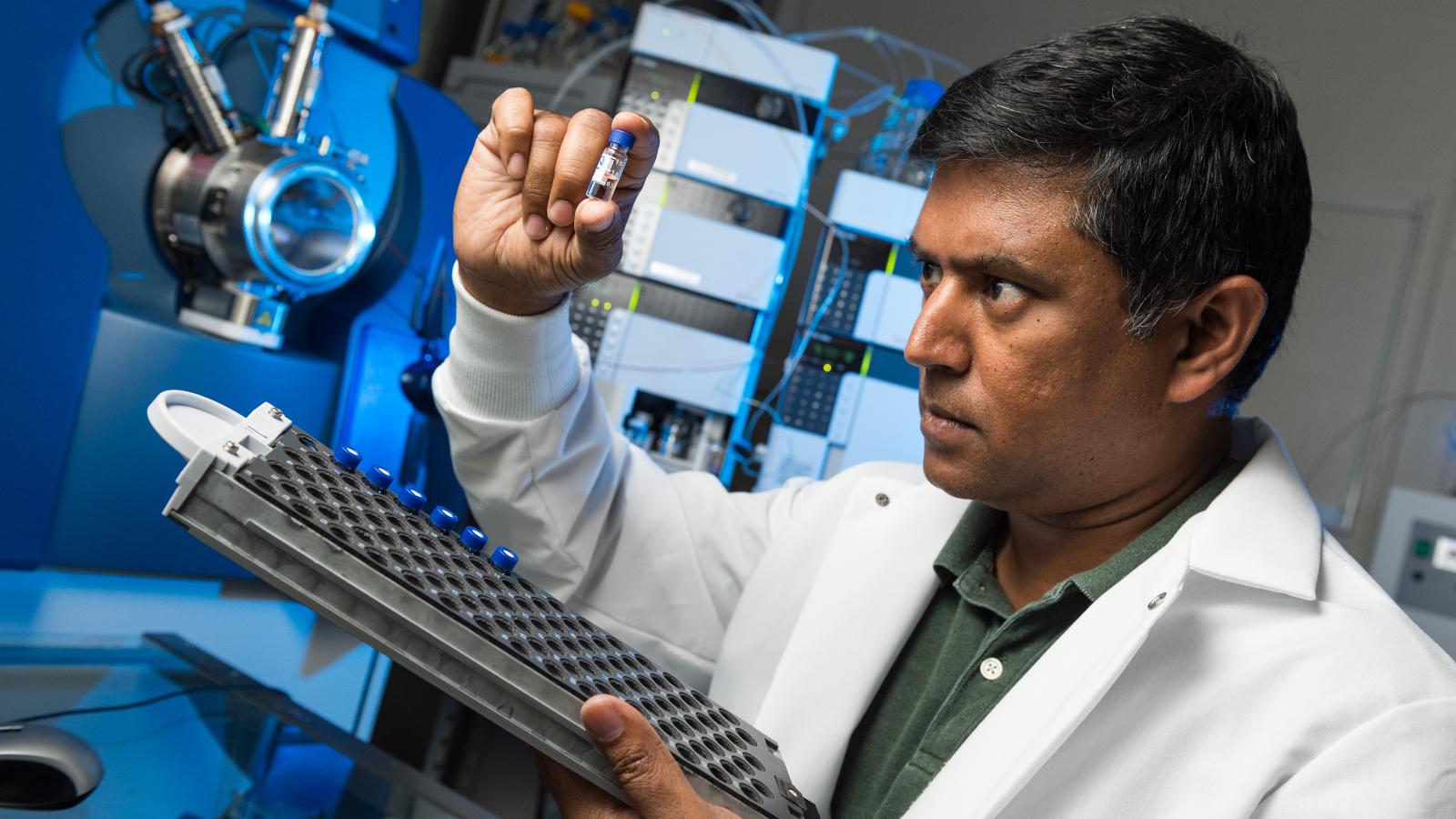
Dr. Wijesinghe examines a patient’s plasma sample extract before analyzing it with the chromatographic separation device and mass spectrometer on the MCV Campus at VCU Health. Photo: Kevin Schindler
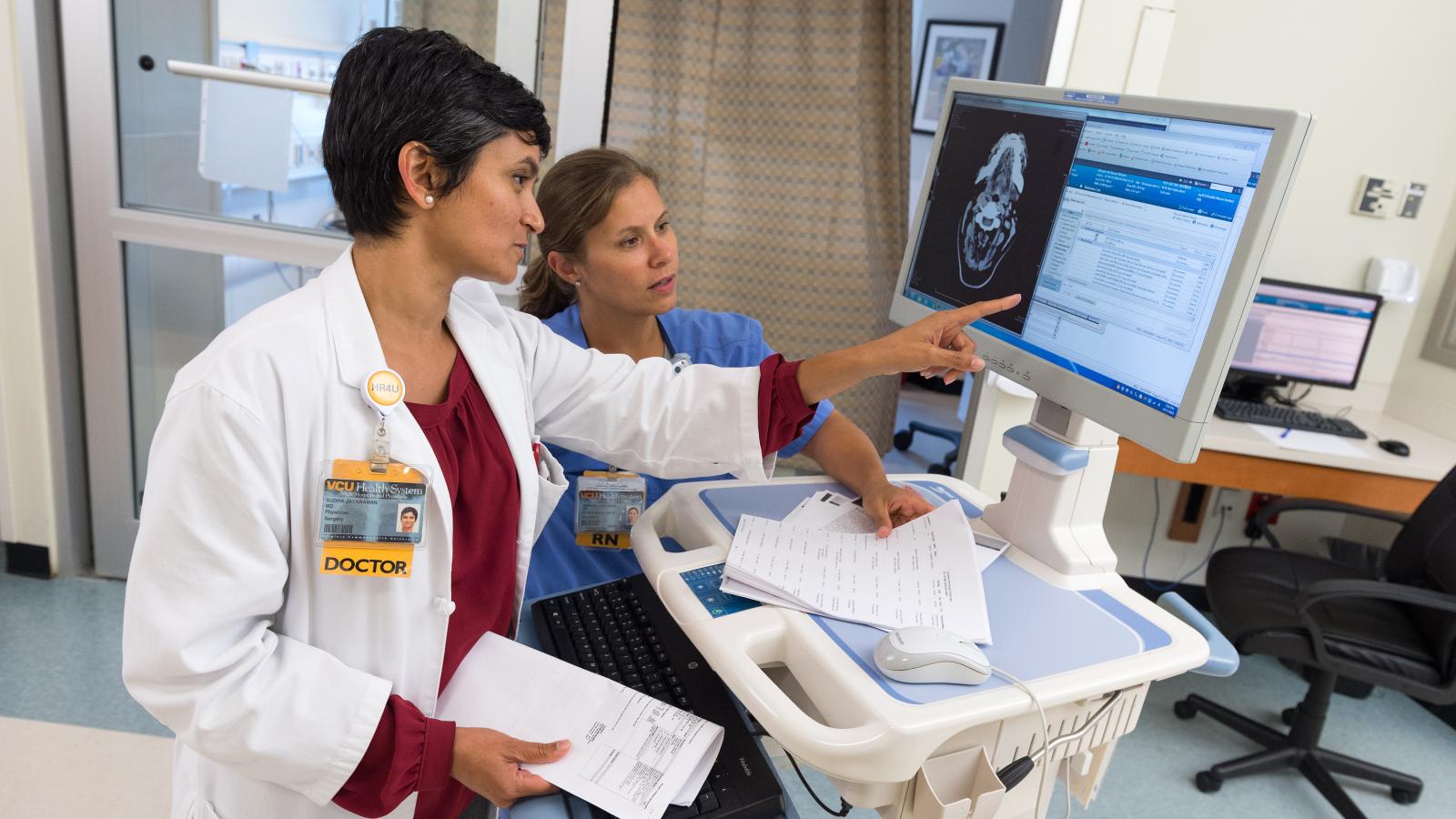
Dr. Jayaraman and Kimberly Baldwin, R.N., read through a medication list and discuss a patient’s case in the surgical/trauma ICU at VCU Medical Center. Photo: Kevin Schindler
A Better Way: Medication Reconciliation in the ER
Medication reconciliation is the term used when doctors and nurses try to determine all the medications that a patient is currently taking — including frequency and dosage. While this may seem like a straightforward discussion in the relaxed setting of a scheduled appointment with a family doctor, what happens in a trauma setting when time is of the essence and the patient is unconscious or disoriented and unable to answer?
“When a patient comes in after a major trauma like a car crash, I need to know what medical problems the person has and what medications they are taking that might affect my decision to operate on them emergently,” explained trauma surgeon Sudha Jayaraman, M.D., associate professor of surgery, VCU School of Medicine, and co-director, Program for Global Surgery at VCU Health.
Dr. Jayaraman explained that, across the country, the current process involves asking the patient about any medications he or she is taking. If the patient is unable to answer, the medical team moves on to the patient’s family members, primary care physician and pharmacist. However, these people won’t necessarily know every medication the patient takes or whether the patient actually took the medication that day. It’s a time-consuming and unreliable process.
“It seems like a simple question,” she said, “but it’s actually quite complicated. We need to know what medicines patients have in their systems or what they are supposed to be taking. We need to know if they are on blood thinning medicines or if they took their spouse’s pain medicine because their knee was hurting that day or if they skipped their heart medicine that morning because it upset their stomach.”
In an environment that demands both speed and accuracy, Dr. Jayaraman knew she had to figure out a better process.
“I was meeting with a new colleague and discussing how more people are on blood thinning medications, but one of the challenges is that there is currently no reliable test to identify some of these medications. He jumped in and said, ‘We have a technology that could be applied to that!’” explained Dr. Jayaraman.
That colleague was VCU School of Pharmacy assistant professor Dayanjan “Shanaka" Wijesinghe, Ph.D., director of the Laboratory of Pharmacometabolomics & Companion Diagnostics.
“In metabolomics, we study the underlying biochemical abnormalities that lead to diseases,” explained Dr. Wijesinghe. “One of the first things we do is identify all the drugs in a patient’s system and remove that data from our analysis — it’s a data cleanup method.”
While this technology has been used in research for a while, Drs. Jayaraman and Wijesinghe realized it could be applied to trauma patients in a clinical setting.
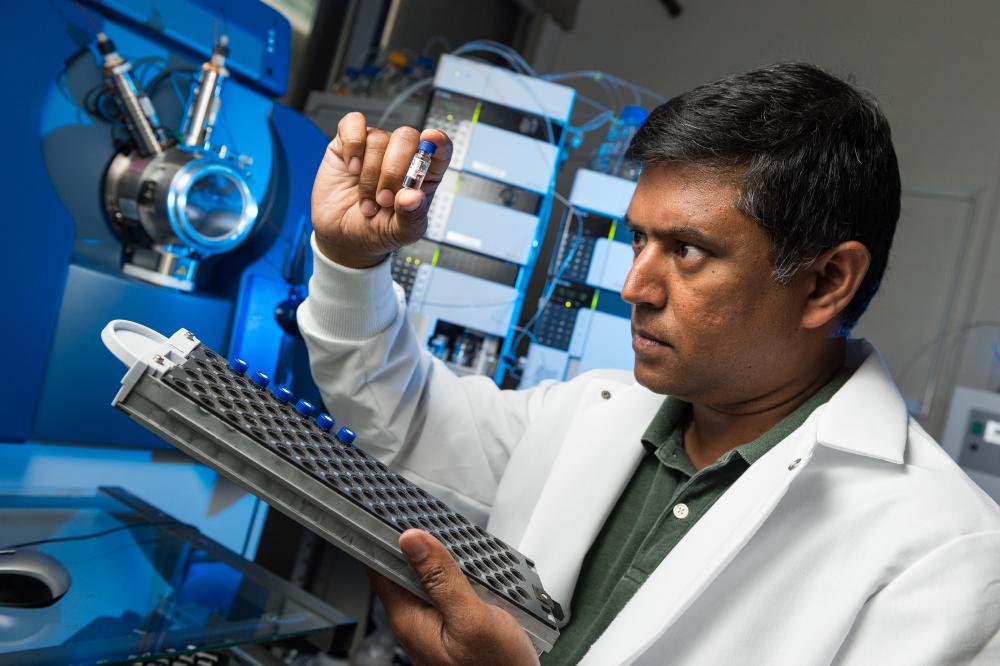
How does it work?
The technology Dr. Wijesinghe referenced is called Ultra Performance Liquid Chromatography coupled to High Resolution Mass Spectrometry — abbreviated as UPLC-HRMS or even shorter as LC-MS. With this technology, researchers will be able to accurately identify the molecules and corresponding medications that are present in a patient’s blood plasma.
Dr. Wijesinghe explains it to his students by asking if they could identify five different but unknown types of cars if they were only told how much each one weighs. “We know an SUV weighs more than a compact car so we can figure that out without much trouble. However, a Toyota Camry and Honda Accord might weigh the same, so you need to start taking the car apart piece by piece,” said Dr. Wijesinghe. “You might find out that they have different steering wheels with different weights, so you would use the weights of the component parts to identify the car. That’s what we do with mass spectrometry.”
Moving From the Lab to a Clinical Setting
In 2014, Drs. Jayaraman and Wijesinghe put together a proposal for a clinical investigation to determine the feasibility of using LC-MS testing in a trauma setting. The results of the clinical investigation were incredibly accurate. The LC-MS technology was able to correctly detect a patient was on blood-thinning medications with 94.87% accuracy and was also able to correctly identify the exact medication with 99.11% accuracy.
“These results are very exciting and show that LC-MS would be a valuable test to aid in medication reconciliation, especially with trauma patients,” said Dr. Wijesinghe.
An equally important outcome of this investigation is the dramatic increase in speed to obtain accurate medication information. While the current process can take up to two days to obtain enough information to make a safe clinical decision, the goal of the LC-MS test being developed is to provide this information in 30 minutes or less.
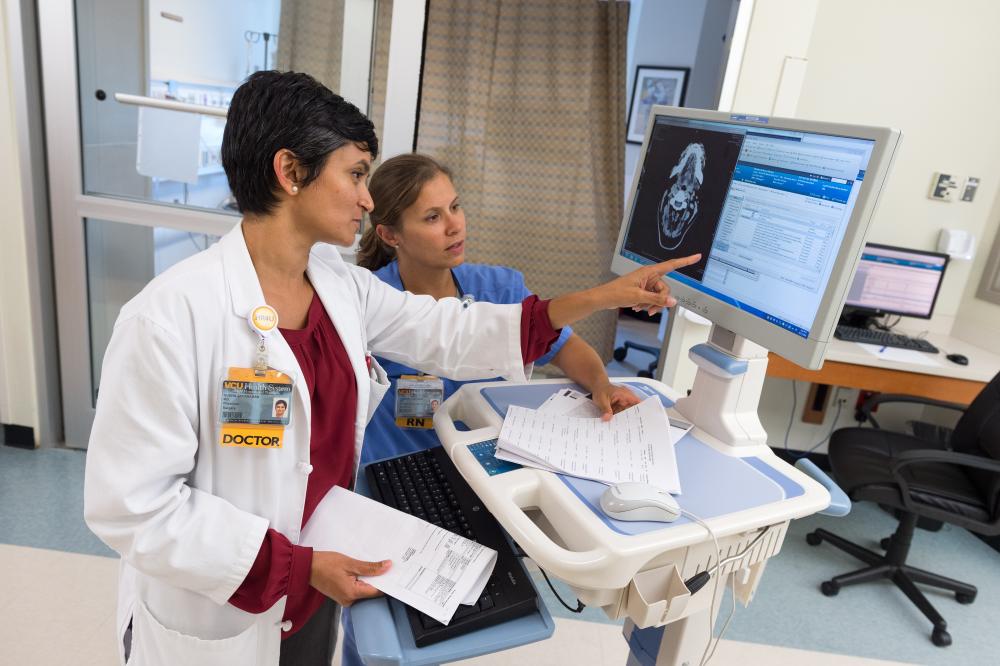
What’s Next?
“There are 1,500 FDA-approved medications in the U.S. and the list is growing every day,” said Dr. Jayaraman. “In the emergency setting, there are about 200-300 medications that are really important to identify. We’d like to use LC-MS testing to establish a library of identification metrics for these top 200-300 medications.”
The team will create an overall test panel as well as specific panels for groups of patients experiencing different types of trauma.
Drs. Jayaraman and Wijesinghe are closing in on that goal thanks to the funding they have received through grants from VCU’s C. Kenneth and Dianne Wright Center for Clinical and Translational Research, the VCU President’s Quest for Commercialization Fund through VCU Innovation Gateway, and a Commonwealth Research Commercialization Award from the state. They have a patent pending and are working with VCU Innovation Gateway to advance this technology and make it more widely available.
“There are so many great opportunities within VCU Health for innovation. It’s a very collaborative institution that fosters outside-the-box thinking,” said Dr. Jayaraman.
That’s the benefit of being at an academic health center like VCU. By pulling together people with diverse strengths, interests and experiences to approach a problem from different angles, VCU Health remains on the cutting edge.
“I see patients on a daily basis where I wish I had this test,” said Dr. Jayaraman. “It would be so helpful in our clinical decision-making and make the care we provide safer. I can’t think of a physician who wouldn’t want this test.”
Endowments and other giving tools are extremely important to the quality of our campus programs and to the success of our students, faculty and research. To learn more about these tools and how you can be a part of saving lives on the MCV Campus, please visit our giving page. To fund this specific research, select Pharmacy Current Fund from the dropdown menu and note this research project on the form.

